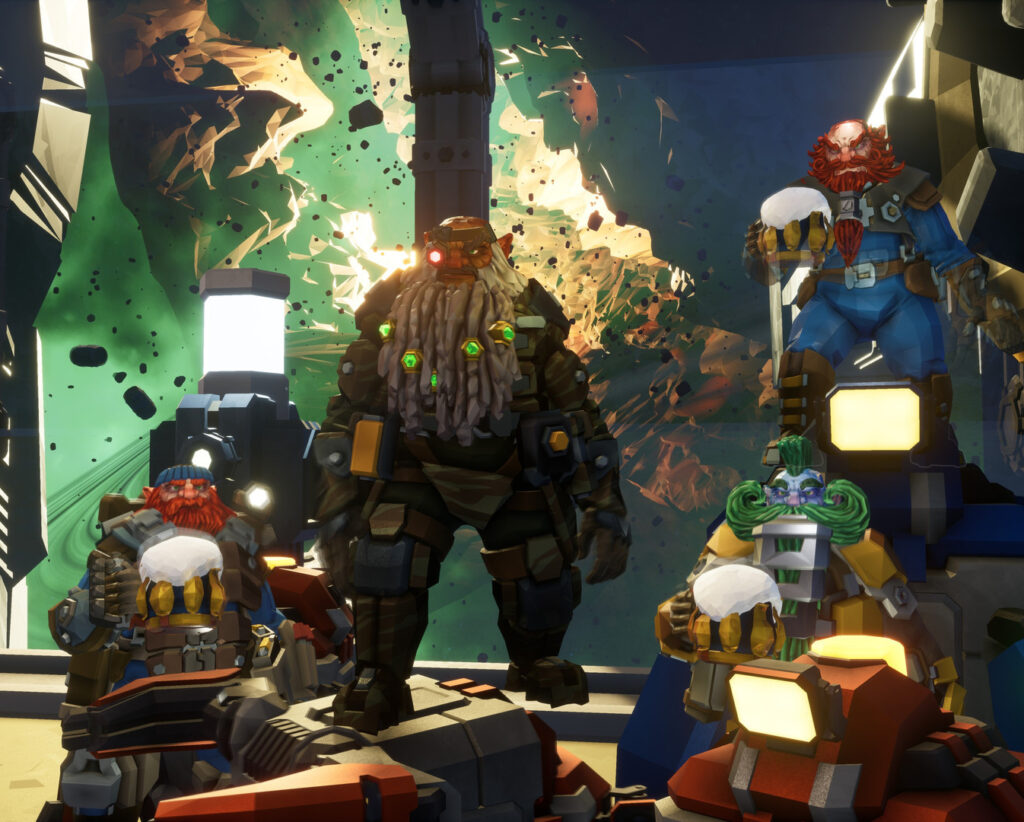Through the use of Rhetoric, Deep Rock Galactic manages to create a 4 player Co-op game which reinforces a positive mindset and teamwork with your teammates through optional in-game features. To complete the game efficiently and effectively, working as a team is a must, and with persuasions through in-game mechanics, it builds up a positive reinforcement which builds you into a better person.
"The best rhetoricians are those who can adapt their communication style to resonate with different audiences."

-Octavio Paz
As someone who has interacted with computers most of my life, it could be said that my favorite leisure time has been dedicated to video games. I’ve played multiple different genres, ranging from strategy games to looter shooters, but the one I keep coming back to is the Co-op Genre. With that being said, arguably one of the most friendly and interactive co-op games I have ever witnessed is Deep Rock Galactic. I have interacted with other similar games and they do not measure in comparison to the true “Co-op” vibe and feel the game gives.
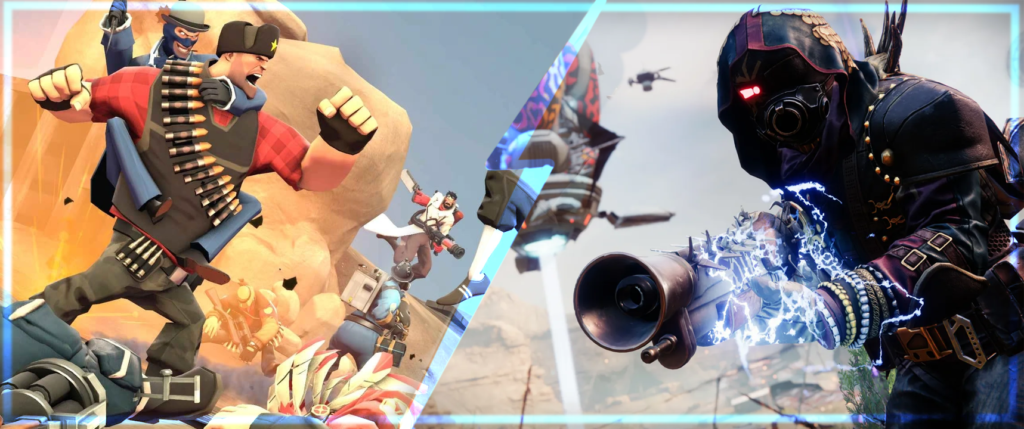
Depiction of TF2 (left) and Destiny 2 (right). Image by Contentstack.com and Bungie.
Other similar games, like Team Fortress 2 or Destiny 2, Don’t hold a candle to how impactful it feels to be working together as a team. Team Fortress ironically has less of a team focus than what it says on the card, being much more of a “each for themselves” type of game. There are design choices in the game that try to have the player interact as a group, but they fall flat, either from lack of indication or mechanics that can just be avoided entirely. For Destiny 2, even for being formulated as a Co-op Game, it ends up setting a toxic environment for the whole party involved due to a mix of unbalanced gameplay and poor management of the game from the developers side. Deep Rock Galactic has managed to deliver on the issues of both fronts and defines what it means to be a true Co-op game.
Launch trailer of Deep Rock Galactic (2016 Ghost Ship Games)
WHAT IS DEEP ROCK GALACTIC?
Deep Rock Galatic, or “DRG”, is a co-op shooter created by the company Ghost Ship Games, which sets us in the world of a futuristic mining corporation in similar name. You are traversing the planet known as Hoxxes IV, scouring the planet for resources while defending your life from the natural inhabitants of the planet: the Glyphids. You and a team of 4 set out doing mining related missions such as digging up precious morkite, or holding your ground on an extraction point defending off approaching enemies while carrying cargo.
In and out of gameplay, Deep Rock employs certain tactics to interact with your teammates to strengthen your bond, using what we call Procedural rhetorics.
“Procedural rhetoric focuses on how game makers craft laws and rules within a game to convey a particular ideology.”

-Ian Bogoost
Procedural rhetoric is defined as “the art of persuasion by rule based representations and interactions rather than spoken or written word” (Wikipedia.com), and I would say this is the perfect representation of how DRG shapes you as a person. The most the game will show you directly is either through small popups which feature controls on how to play the game, or through quips from Mission Control, a non-interactive entity who informs you on mission briefings and incoming swarms. For the most part it’s up to the player to interact with the items presented with them and form a connection between them.
Humble BEGINNINGS
Before the player can start real missions, they are greeted with the space rig, the social hub of the game. From here, you can have players join and interact with you and the environment around them. There are many interactable objects, ranging from drinking beers in the bar to jamming out to the jukebox. Most of these features do not impact the mission gameplay in any variety, in a way this is the secondary gameplay of DRG: Drinking beers with your team and getting drunk, kicking barrels around the rig, doing mini games such as space soccer or jetty boot (flappy bird knockoff); It’s all about just messing around and forming a connection with your members even before the mission starts.
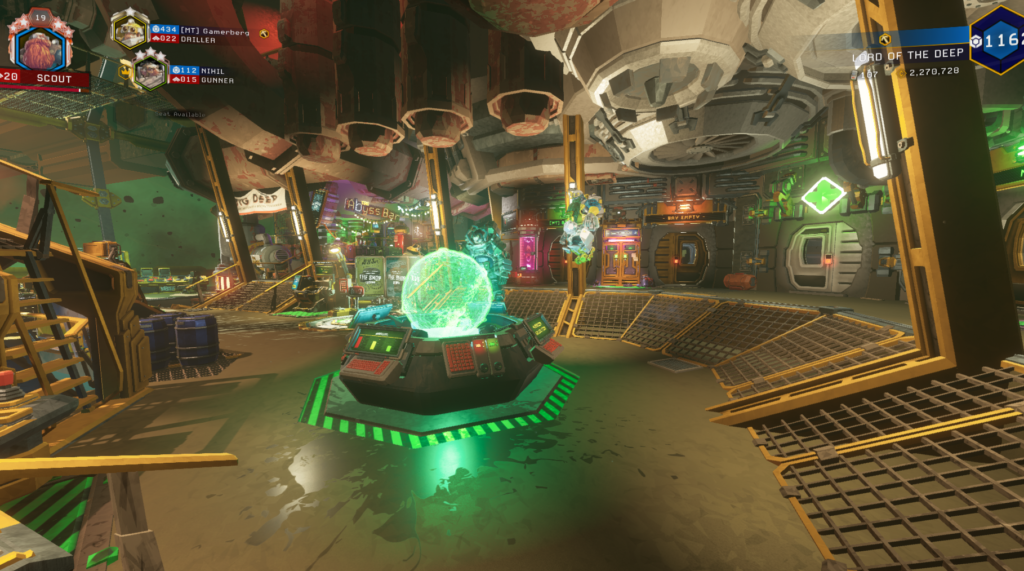
Space Hub Main Room, where you can chill with other people pre-mission- Image by Matthew Duncan
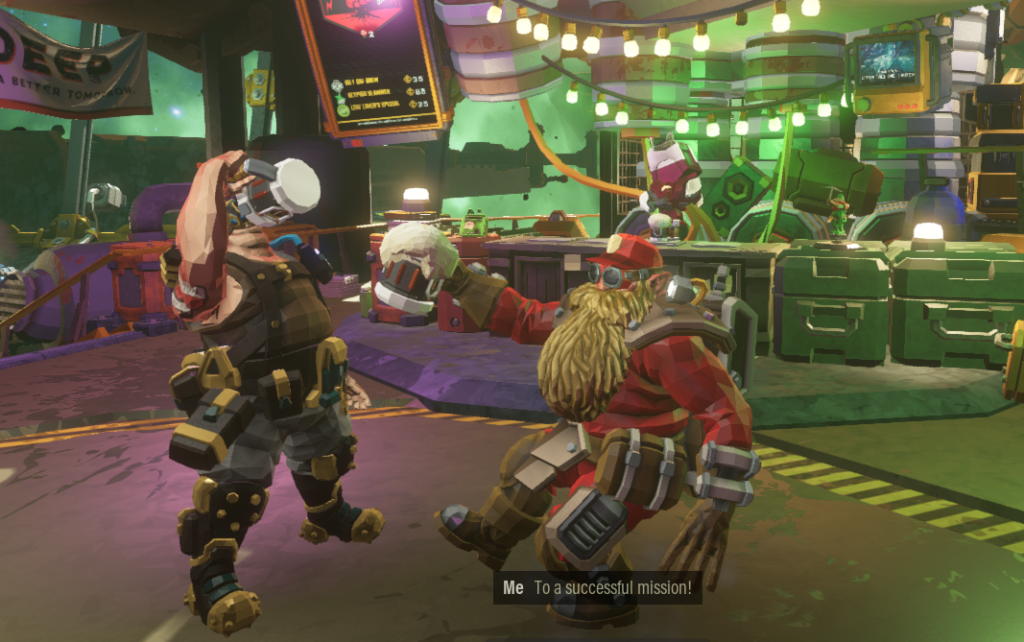
Jamming out to some tunes while drinking with a teammate- Image by Matthew Duncan
Class Interactions
Once the mission starts, you are presented with four possible classes to choose from: The Scout, who specializes in mobility with their grappling hook; The Engineer, who builds platforms for transversal and sentries for support; The Driller, who can dig through the terrain through its drills and C4, and the Gunner, who is the main damage dealer of the team with a placeable shield bubble for protection.
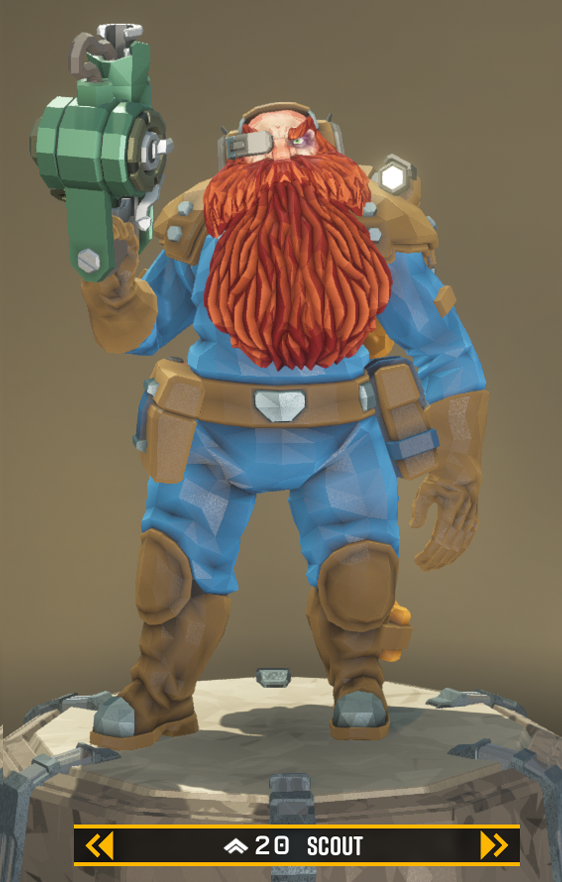
Scout-Image by Matthew Duncan
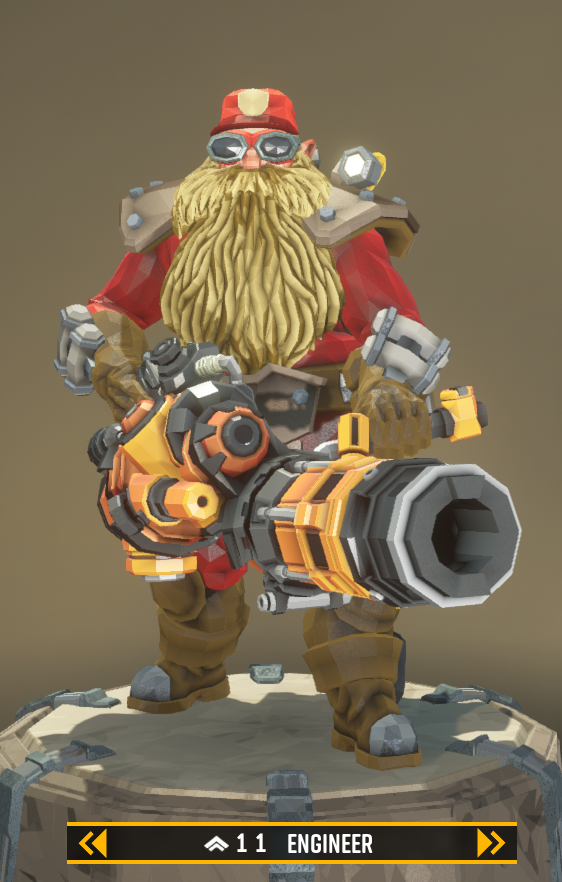
Engineer-Image by Matthew Duncan
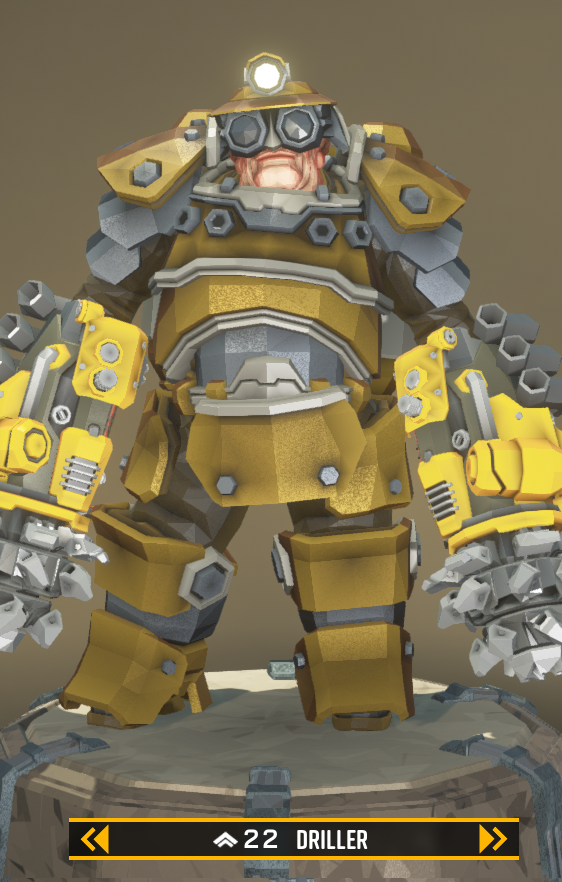
Driller-Image by Matthew Duncan
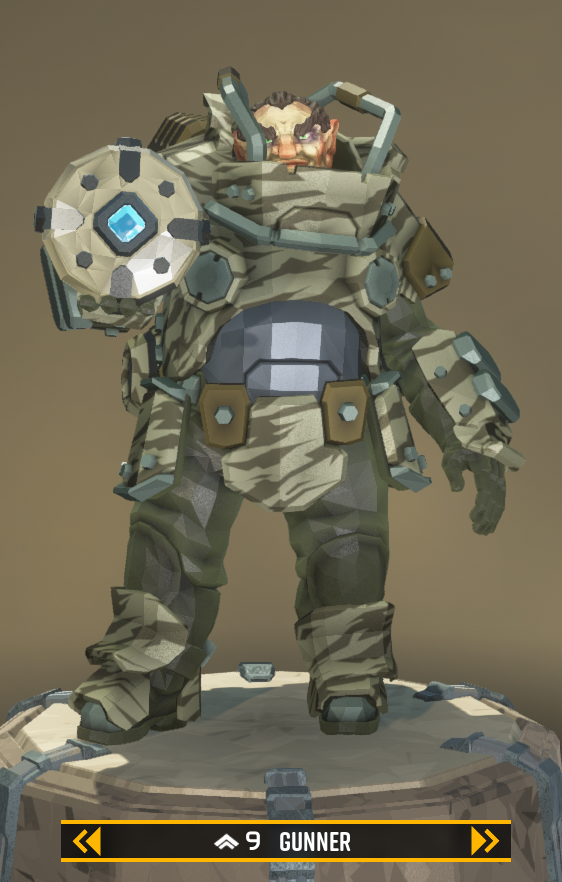
Gunner-Image by Matthew Duncan
Each class is specialized to perform specific tasks to help the team complete their certain objectives. Scout uses their grappling hook to reach high up minerals, or the driller digging through the terrain with their drills to get through new areas. Overall they make a vital part of the team, and not having one of the classes does have a noticeable effect on the gameplay. However, classes can also combine their abilities to become more efficient and stronger in the mission.
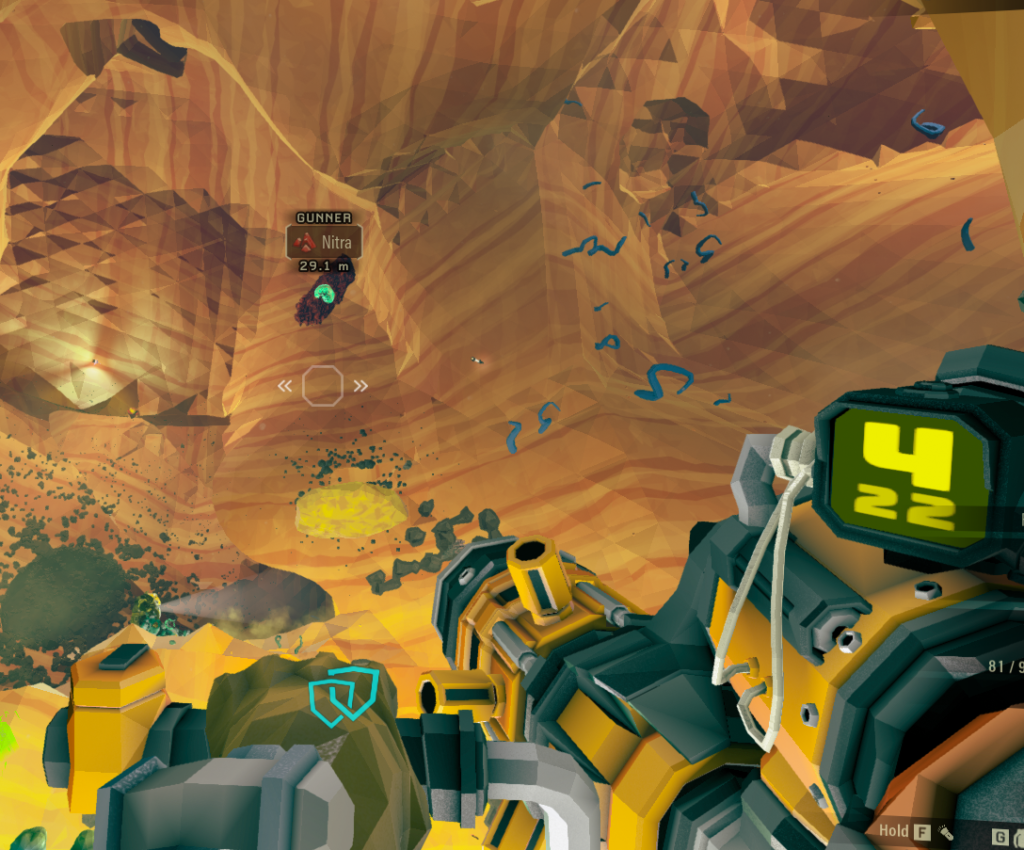
The Nitra is too high up for the engineer to reach, but too risky for the scout to grab alone.-Image by Matthew Duncan
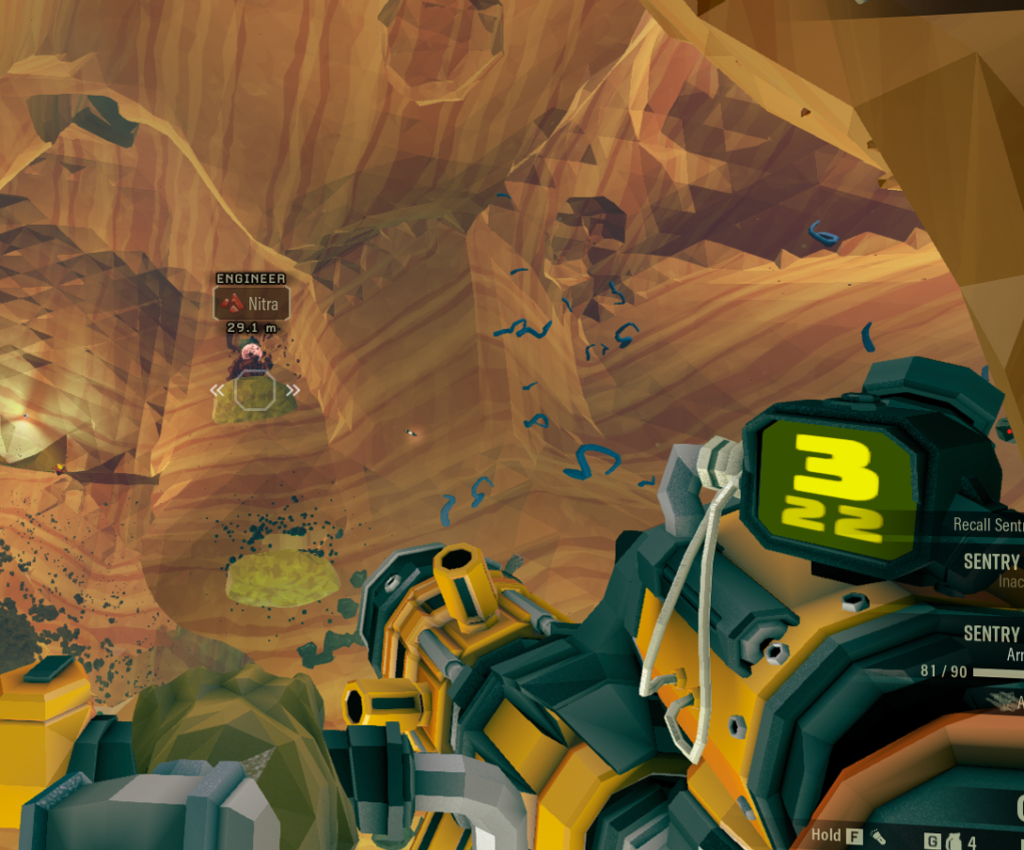
The Engineer’s platforms allow the Scout to safely grab the minerals.-Image by Matthew Duncan
A prime example is when either minerals high up and are too dangerous to traverse, or cannot be accessed through normal means. An Engineer can place a platform up where the minerals are, and the Scout can safely use their grappling hook to reach the area and mine the minerals. There are many more interactions in the game where you directly interact with your teammates to achieve a common goal, giving off that bonding mentality and feeling like you’re making an impact. The game doesn’t specifically tell you about these things, however these are connections the player realizes through playing the game as a team.
The Ping System
DRG probably has the best communication system in a game I have seen; being user friendly, efficient, and fun to use. Using Ctrl, you can hover objects and “ping” them, highlighting objects or even your teammates and get a little description about them. These are usually little funny quips or remarks, which add to the buddy like feel to the game. I can’t tell how many moments I’ve messed around pinging my teammate multiple times for them to ping back until we celebrate. The ping tool allows anyone to “communicate” without having to use chat or voice, which adds to the availability of the game to the not-as social people.
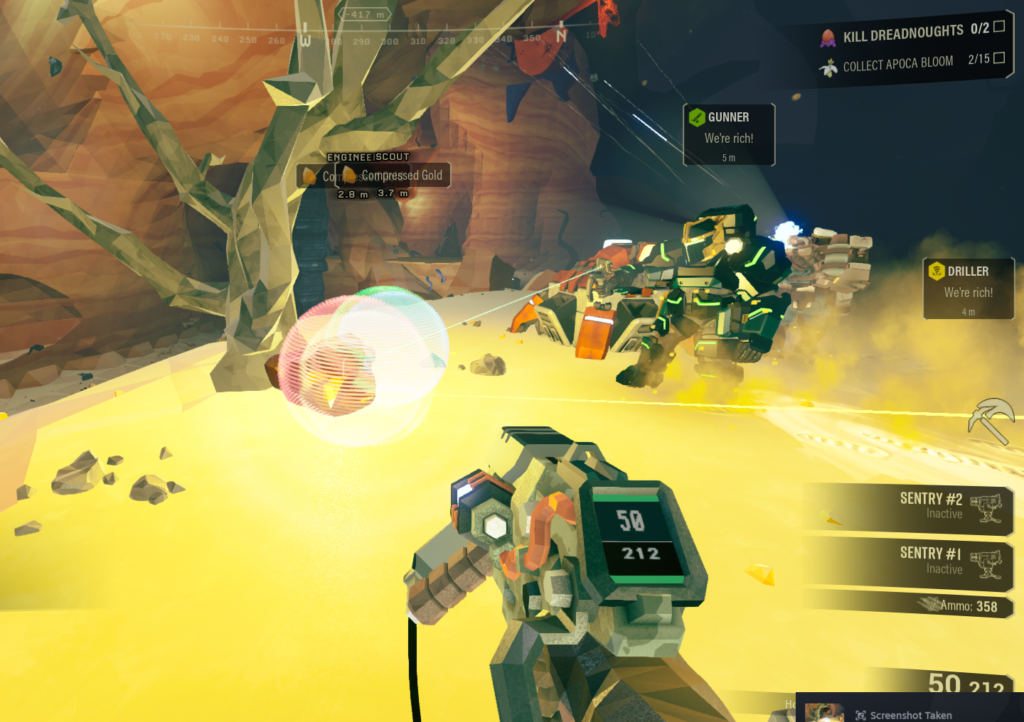
Inacting a Common DRG Ritual, Spam Pinging “We’re Rich” on Compressed Gold – Image by Matthew Duncan
ROCK AND STONE
If there is one thing to take away from how DRG persuades people to be more of a caring team player through interaction alone, it would be DRG’s Rock and Stone. Using the V button, you raise your pickaxe and shout out a celebratory battle cry relating to the words “Rock and Stone”. For gameplay, it literally does nothing to achieve your goals or objectives, but functionally, it serves as the groundwork for the teamwork mindset.
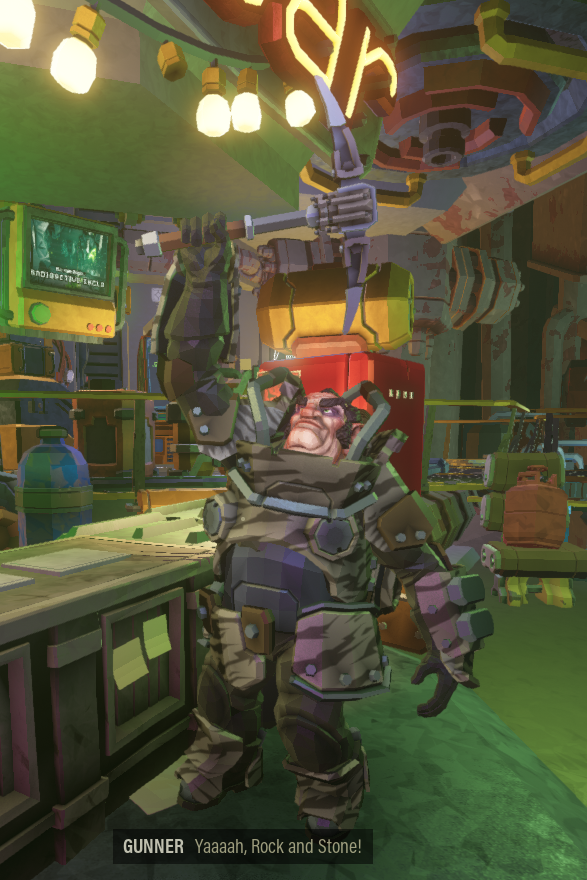
A Fellow Dwarf Rock and Stoning- Image by Matthew Duncan
You want to start the objective? Rock and Stone. You want to reinforce a teammate’s job well done? Rock and Stone. It serves as a yes, a positive reinforcement button, and a celebratory button all in one.
Rock and Stoning has even reached outside the gamespace. Users on forums and videos with slightest hints of Deep Rock shout in unison: “Rock and Stone!”. It has become the sleeper agent phrase for positivity through continued use of the feature, which the game never forced you to use once.
Closing Remarks
To wrap it up all in a nice bow, DRG manages to create a 4 player Co-op game which reinforces a positive mindset and teamwork with your teammates through its optional in-game features. To complete the game efficiently and effectively, You have to work as a team, and the slow build up of positive reinforcement it brings builds you into a better person.
Through the art of procedural rhetoric, the developers fester a heartwarming and collective culture through the visuals and interaction the players are presented with, and this culture seeps out into the outside virtual world, shaping the player through meaningful persuasion of mostly optional game mechanics.
